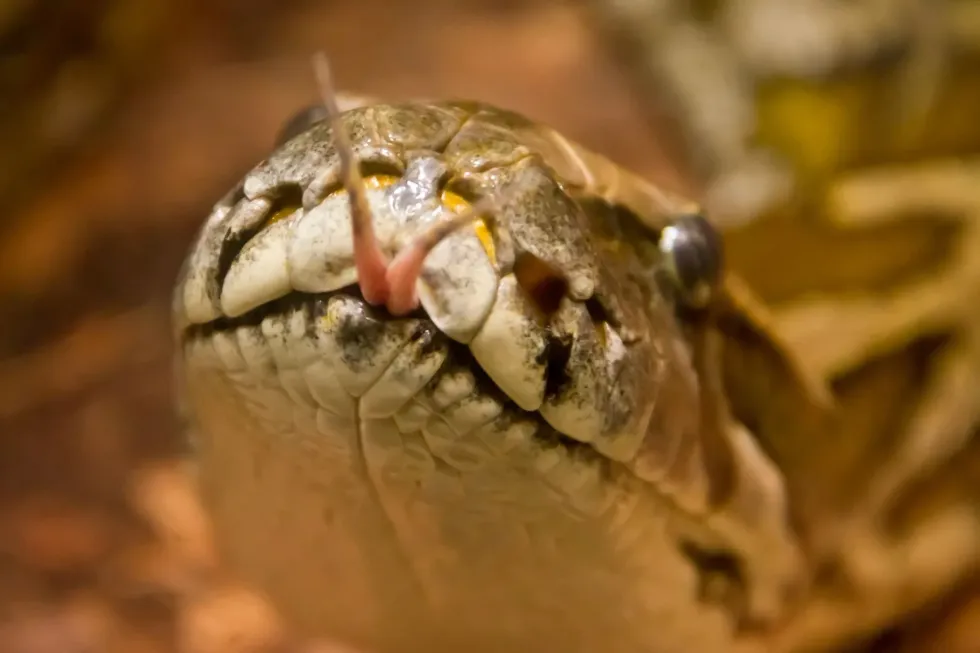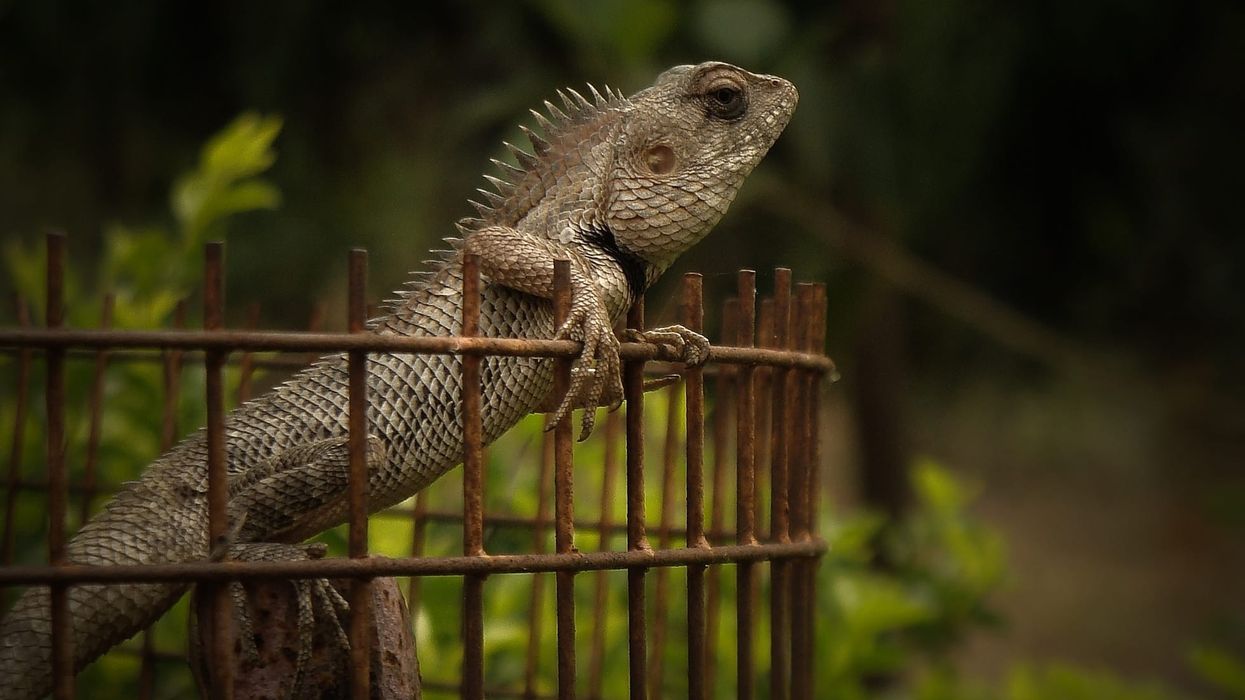The biggest African rock python (Python sebae) is the largest snake in Southern Africa, belonging to the family of Pythons in the order of scaled reptiles. They can easily camouflage with their surroundings because of the pattern and color of their skin.
Like other pythons, the African rock python is non-venomous and kills its prey by coiling its robust skin around it till the prey is choked to death. Like all snakes, the South African rock python swallows its prey entirely. They attack small to medium-sized birds, mammals, and vertebrates.
They are spread throughout the Sub-Saharan desert of Africa and are also found in Namibia and Ethiopia. They are hunted for their meat and are devoured as a delicacy.
The conservation status of the albino African rock python (Python sebae natalensis) is classed as not extinct, but their population is declining due to habitat loss and degradation, and hunting. After reading these interesting facts about the non-venomous African python, check out our other articles on the reticulated python and the green anaconda.
African Rock Python Interesting Facts
What type of animal is an African rock python?
The African rock python's scientific name is Python Sebae, and it is a snake belonging to the family Pythonidae. They are the largest snake species found in entire Africa.
What class of animal does an African rock python belong to?
The African rock python, or the python sebae, belongs to the class reptilia. They do not strike their prey as the glands producing venom in their body are absent.
How many African rock pythons are there in the world?
The exact number of African rock pythons living in the wild is currently unknown but their conservation status is listed as Not Extinct. Their populations are mostly found on the African continent but an evident decline can be seen.
Where does an African rock python live?
African rock pythons live in the woods, the desert, savanna, and grasslands. They can camouflage well with their surroundings because of their color and pattern of their skin.
What is an African rock python's habitat?
The African rock python is found in multiple habitats like the Sub-Saharan desert, rocky areas, grasslands, mangroves, evergreen forests on the edges of rivers, swamps, and lakes, and other sites with permanent water. These species are often considered to be dwellers of freshwater habitats.
Who do African rock pythons live with?
African rock pythons are solitary in nature and this species forages on the ground for food alone. The mother African rock python cares for her babies after they hatch from around 100 eggs that are laid at one time. African rock pythons also are observed to congregate during the breeding season.
How long does an African rock python live?
The average lifespan of an African rock python is 2o to 30 years. These predators have a long lifespan and are often held in captivity. The oldest African rock python protected in the San Diego Zoo was recorded to live for 27 years and four months.
How do they reproduce?
The male and the female African rock pythons reach sexual maturity when they are between three and five years old. The breeding season commences in November and continues until March.
The gestation period in African rock pythons occurs for 65-80 days and 20-100 hard-shelled African rock python eggs are laid by the females. The African rock pythons reproduce through copulation.
What is their conservation status?
The conservation status of the African rock python endangered list is listed as Not Extinct. They are often hunted by humans for their meat and are a delicacy in some parts of Africa.
African Rock Python Fun Facts
What do African rock pythons look like?

African rock pythons have a triangular head that has irregular scales on them. Their entire body is covered in black spots, which are irregularly placed on olive, brown, or buffy yellow skin. Members of this snake species are scaled reptiles and are considered to be the largest snakes found in Africa.
How cute are they?
This snake species is not very cute as these predators are reptiles and look like extremely ferocious creatures. These snakes are exotic snakes and their skin is patterned.
Some of the African rock pythons and Burmese python hybrid snakes are known to be quite aggressive as well, so cuteness is the last word that will come to your mind on seeing these creatures.
How do they communicate?
The males send body vibrations to the females while mating. These African snakes also communicate through pheromones and by leaving scents marks which could signal different things.
How big is an African rock python?
The average African rock python size is 13-24 ft, but they have been recorded to be 42.6 ft long. The average weight is between 70-100 lb and can reach 120 lb.
How fast can an African rock python move?
The African rock python's attack is quite dangerous. This southern African species are not fast-movers and move at a speed of 1 mile per hour, instead, they camouflage themselves with their surroundings and let the prey approach them in order to suffocate them.
How much does an African rock python weigh?
The average African rock python weight is 70-120 lb. A few specimens of the African rock pythons have been recorded to have a body mass of more than 300 lb.
What are their male and female names of the species?
There are no distinctive names for the male and female species of African rock pythons. Members of this species are called male and female African rock pythons.
What would you call a baby African rock python?
Bab African rock pythons are called hatchlings. The hatchlings are taken care of by the mother.
What do they eat?
African rock python eat small to medium-sized animals and birds. Warthogs, antelopes, herons, rodents, wild dogs, and goats are suffocated by the African rock python by coiling around its large body which chokes the oxygen supply of its prey, and the prey then dies due to a cardiac arrest.
Are they dangerous?
These are non-venomous snakes and not dangerous to humans. But the African rock python teeth are extremely sharp and can inflict a deep wound that would require medical attention.
Would they make a good pet?
Since the conservation status of these species of pythons is listed as Not Extinct, having a pet African rock python must be avoided by any human being. These creatures are native to forest settings and must be allowed to thrive and reproduce in the wild.
Though this snake can live for several years if held in captivity, these are wild reptiles that belong in nature. So adopting an African rock python pet is not a smart idea by any stretch of the imagination.
Did you know...
The female African rock python fasts until the eggs are laid. There are two subspecies of the African rock python: the python sebae sebae, commonly called the northern African rock python, and the python natalensis, or southern African rock python.
What body parts does the African rock python use for its survival?
Heat-sensitive pits placed near the lips help the African rock python to detect warm-blooded animals. The African rock python also has two lungs which are unlikely to be seen in less-advanced snakes. African pythons also have visible pelvic spurs, which determine the sex of the python.
How many eggs does an African rock python lay?
The African rock python lays 20-50 hard-shelled eggs in tree hollows, termite mounds, or burrows of rodents and other animals. The female coils herself around the eggs and incubates them. The maximum number of eggs laid by the female African rock python can reach 100 eggs.
Here at Kidadl, we have carefully created lots of interesting family-friendly animal facts for everyone to discover! Learn more about some other reptiles including the mangrove snake and the black rat snake.
You can even occupy yourself at home by drawing one of our African rock python coloring pages.










